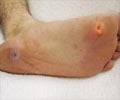A new report highlights that the COVID-19 pandemic has interrupted reproductive health services mainly among vulnerable communities such as sex workers.

‘Governments should have strong health systems, and a rights-based approach to essential reproductive health services, through meaningful participation of the vulnerable communities even during the COVID-19 pandemic.’





"While our day to day health needs, including sexual and reproductive health needs, do not stop because of an epidemic, but health service availability becomes still more difficult during such times" said Alexandra Johns, executive director of Asia Pacific Alliance for Sexual and Reproductive Health and Rights (APA).There is a global shortage of medical supplies, including medicines for people living with HIV, contraceptives, and antibiotics, as a fallout of lockdowns imposed by governments to stem the tide of COVID-19. The situation is graver for key and vulnerable populations, including sex workers.
It is very difficult for them to access reproductive health services, leading to unwanted pregnancies and also sexually transmitted infections like HIV.
In many countries, sex workers are facing a huge financial crisis, with bars, restaurants, and other places closed. For them, loss of income is a bigger concern than the virus, as they are the sole breadwinners for their families.
Then again, most of the health providers are focusing on managing COVID-19 and not on providing sexual and reproductive health services and treatment for other health problems.
Advertisement
Sex workers are not looked down upon as ’other people in society.’ Most of them are carers, mothers, and family providers. They are not that different from other workers, but they are excluded from labor protections and social security benefits.
Advertisement
Apart from that, brothels are all thickly packed with women, if one of them gets infected it will spread quickly to others. Though most sex workers are young, there is a critical number of those who are old and/or who live with co-morbidities like diabetes, TB, or HIV.
There is no way this community is going to weather this situation easily. We will need the government to step in a big way to help them.
Due to the existing social inequities, even the scientific advisories issued by governments of the region need to protect oneself from the coronavirus are beyond the capacity of many to follow.
People are being told to wash their hands repeatedly assuming that they have access to clean water and sanitation facilities, which many do not have. Then again maintaining physical distancing is a huge problem for many, like those living in very confined spaces in brothels and slums.
Hopefully, COVID-19 will pass, but systemic barriers to making sexual and reproductive health services available to all will remain unless governments act proactively.
For sex workers, lack of information and lack of access to sexual and reproductive health services are big barriers. In some countries, these services are not available to them at all.
Even where those are available, these are either not affordable for many sex workers and/or there is a lack of information about what services are available and who provides them.
Government should not only address these issues urgently but also generate more data around sexual and reproductive health and rights (SRHR).
Evidence-based qualitative data from the community members is necessary to monitor progress and advocate with policymakers. Engaging civil society in decision making is imperative to ensure an effective and appropriate response.
Government must acknowledge the experience and expertise of the communities (like sex workers), and gain their trust to work with them.
Meaningful community engagement is very effective, especially in times of crises like COVID-19, when sex workers’ led organizations are working with the community to spread awareness around COVID-19 and also providing them with condoms, lubricants, masks, and hand sanitizers.
Source-Medindia















